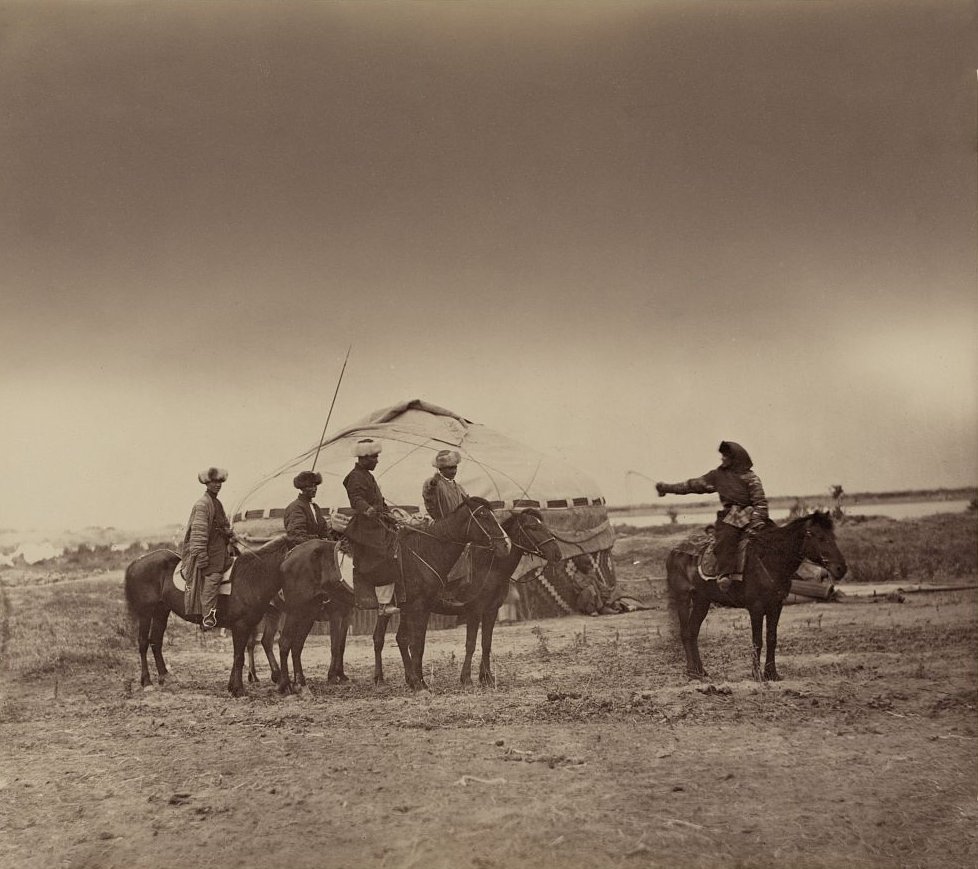|
Ala Kachuu
Ala kachuu () is a form of bride kidnapping practiced in Kyrgyzstan. The term can apply to a variety of actions, ranging from a consensual elopement to a non-consensual kidnapping, and to what extent it actually happens is controversial. Some sources suggest that as of 2005 at least a third of Kyrgyzstan's brides had been taken against their will. ''Kyz ala kachuu'' () means "to take a young woman and run away". The typical non-consensual variety involves the young man abducting a woman either by force or by guile, often accompanied by friends or male relatives. They often take her to his family home, where she is kept in a room until the man's female relatives convince her to put on the scarf of a married woman as a sign of acceptance. Sometimes, if the woman resists the persuasion and maintains her wish to return home, her relatives try to convince her to agree to the marriage. The practice was suppressed during the Soviet period, but, after the collapse of the Soviet Union, ' ... [...More Info...] [...Related Items...] OR: [Wikipedia] [Google] [Baidu] |
Bride Kidnapping
Bride kidnapping, also known as marriage by abduction or marriage by capture, is a practice in which a man abducts the woman he wishes to marry. Bride kidnapping (hence the portmanteau bridenapping) has been practiced around the world and throughout prehistory and history, among peoples as diverse as the Hmong in Southeast Asia, the Tzeltal in Mexico, and the Romani in Europe. Bride kidnapping still occurs in various parts of the world, but it is most common in the Caucasus, Central Asia and some parts of Africa. In most nations, bride kidnapping is considered a sex crime because of the implied element of rape, rather than a valid form of marriage. Some types of it may also be seen as falling along the continuum between forced marriage and arranged marriage. The term is sometimes confused with elopements, in which a couple runs away together and seeks the consent of their parents later. In some cases, the woman cooperates with or accedes to the kidnapping, typically in ... [...More Info...] [...Related Items...] OR: [Wikipedia] [Google] [Baidu] |
Sex Trafficking In Kyrgyzstan
Sex trafficking in Kyrgyzstan is human trafficking for the purpose of sexual exploitation and slavery that occurs in the Kyrgyz Republic. Sex trafficking victims, primarily women and girls, in the country are from all Demographics of Kyrgyzstan, ethnic groups in Kyrgyzstan and foreigners. Victims are trafficked within Kyrgyzstan and to other countries in Asia and different continents. Children, persons in poverty, and migrants are particularly vulnerable to sex trafficking. Victims are abducted, deceived, threatened, and or forced into prostitution and marriages. Their passports and other documents are often taken. They suffer from physical and psychological abuse and trauma and are typically guarded and or locked up in poor conditions. A number contract sexually transmitted diseases from rapes. Sometimes their family members are threatened. The government of Kyrgyzstan has been criticized for its inadequate anti-sex trafficking efforts and victim protection services. Corrupti ... [...More Info...] [...Related Items...] OR: [Wikipedia] [Google] [Baidu] |
Raptus
{{wiktionary, raptus Raptus is the Latin for "seized", from ''rapere'' "to seize". In Roman law the term covered many crimes of property, and women were considered property. It may refer to: *any literal seizure **confiscation **robbery **kidnapping ** raptio, i.e. the abduction of women, also known as ''Frauenraub''; these are the "rapes of Zeus". **the term for bride kidnapping in Catholic canon law **rape in medieval English law *medical **seizure **epileptic seizure **stroke **convulsion **focal seizure *in religion, spirituality and subjective experience **rapture, a Protestant belief about the End Times and the transport of redeemed souls **''status raptus'', religious ecstasy ** being "carried away" or "transported", being in good spirits, see Ecstasy (emotion) **out-of-body experience See also *Rape *History of rape The concept of rape, both as an abduction and in the sexual sense (not always distinguishable), makes its appearance in early religious texts. Scholars o ... [...More Info...] [...Related Items...] OR: [Wikipedia] [Google] [Baidu] |
Suicide
Suicide is the act of intentionally causing one's own death. Risk factors for suicide include mental disorders, physical disorders, and substance abuse. Some suicides are impulsive acts driven by stress (such as from financial or academic difficulties), relationship problems (such as breakups or divorces), or harassment and bullying. Those who have previously attempted suicide are at a higher risk for future attempts. Effective suicide prevention efforts include limiting access to methods of suicide such as firearms, drugs, and poisons; treating mental disorders and substance abuse; careful media reporting about suicide; improving economic conditions; and dialectical behaviour therapy (DBT). Although crisis hotlines, like 988 in North America and 13 11 14 in Australia, are common resources, their effectiveness has not been well studied. Suicide is the 10th leading cause of death worldwide, accounting for approximately 1.5% of total deaths. In a given year, ... [...More Info...] [...Related Items...] OR: [Wikipedia] [Google] [Baidu] |
Social Stigma
Stigma, originally referring to the visible marking of people considered inferior, has evolved to mean a negative perception or sense of disapproval that a society places on a group or individual based on certain characteristics such as their socioeconomic status, gender, race, religion, appearance, upbringing, origin, or health status. Social stigma can take different forms and depends on the specific time and place in which it arises. Once a person is stigmatized, they are often associated with stereotypes that lead to discrimination, marginalization, and psychological problems. This process of stigmatization not only affects the social status and behavior of stigmatized persons, but also shapes their own self-perception, which can lead to psychological problems such as depression and low self-esteem. Stigmatized people are often aware that they are perceived and treated differently, which can start at an early age. Research shows that children are aware of cultural stereotyp ... [...More Info...] [...Related Items...] OR: [Wikipedia] [Google] [Baidu] |
Hostage
A hostage is a person seized by an abductor in order to compel another party, one which places a high value on the liberty, well-being and safety of the person seized—such as a relative, employer, law enforcement, or government—to act, or refrain from acting, in a certain way, often under threat of serious physical harm or death to the hostage(s) after expiration of an ultimatum. The ''Encyclopædia Britannica Eleventh Edition'' defines a hostage as "a person who is handed over by one of two belligerent parties to the other or seized as security for the carrying out of an agreement, or as a preventive measure against certain acts of war." A party who seizes one or more hostages is known as a hostage-taker; if the hostages are present voluntarily, then the receiver is known as a host. In civil society, along with kidnapping for ransom and human trafficking (often willing to ransom its captives when lucrative or to trade on influence), hostage taking is a criminal activit ... [...More Info...] [...Related Items...] OR: [Wikipedia] [Google] [Baidu] |
Smallholding
A smallholding or smallholder is a small farm operating under a small-scale agriculture model. Definitions vary widely for what constitutes a smallholder or small-scale farm, including factors such as size, food production technique or technology, Family farm, involvement of family in labor and economic impact. There are an estimated 500 million smallholder farms in developing countries of the world alone, supporting almost two billion people. Smallholdings are usually farms supporting a single family with a mixture of cash crops and subsistence farming. As a country becomes more affluent, smallholdings may not be self-sufficient. Still, they may be valued for providing supplemental sustenance, recreation, and general rural lifestyle appreciation (often as hobby farms). As the Sustainable food system, sustainable food and local food movements grow in affluent countries, some of these smallholdings are gaining increased economic viability in the developed world as well. Small-sca ... [...More Info...] [...Related Items...] OR: [Wikipedia] [Google] [Baidu] |
Nomad
Nomads are communities without fixed habitation who regularly move to and from areas. Such groups include hunter-gatherers, pastoral nomads (owning livestock), tinkers and trader nomads. In the twentieth century, the population of nomadic pastoral tribes slowly decreased, reaching an estimated 30–40 million nomads in the world . Nomadic hunting and gathering—following seasonally available wild plants and game—is by far the oldest human subsistence method known. Pastoralists raise herds of domesticated livestock, driving or accompanying them in patterns that normally avoid depleting pastures beyond their ability to recover. Nomadism is also a lifestyle adapted to infertile regions such as steppe, tundra, or ice and sand, where mobility is the most efficient strategy for exploiting scarce resources. For example, many groups living in the tundra are reindeer herders and are semi-nomadic, following forage for their animals. Sometimes also described as "nomadic" are vari ... [...More Info...] [...Related Items...] OR: [Wikipedia] [Google] [Baidu] |
Arranged Marriage
Arranged marriage is a type of Marriage, marital union where the bride and groom are primarily selected by individuals other than the couple themselves, particularly by family members such as the parents. In some cultures, a professional matchmaking, matchmaker may be used to find a spouse for a young person. Arranged marriages have historically been prominent in many cultures. The practice remains common in many regions, notably the Caucasus, Central Asia, North Africa, South Asia, Southeast Asia, sub-Saharan Africa, Caribbean, and West Asia. In many other parts of the world, the practice has declined substantially during the 19th and 20th centuries. Forced marriages, practised in some families, are condemned by the United Nations. The specific sub-category of forced child marriage is especially condemned. History Arranged marriages were the norm throughout the world until the 18th century. Typically, marriages were arranged by parents, grandparents or other close relatives and ... [...More Info...] [...Related Items...] OR: [Wikipedia] [Google] [Baidu] |
Custom (law)
A legal custom is the established pattern of behavior within a particular social setting. A claim can be carried out in defense of "what has always been done and accepted by law". Customary law (also, consuetudinary or unofficial law) exists where: #a certain legal practice is observed and #the relevant actors consider it to be an opinion of law or necessity ('' opinio juris''). Most customary laws deal with ''standards of the community'' that have been long-established in a given locale. However, the term can also apply to areas of international law where certain standards have been nearly universal in their acceptance as correct bases of action – for example, laws against piracy or slavery (see '' hostis humani generis''). In many, though not all instances, customary laws will have supportive court rulings and case law that have evolved over time to give additional weight to their rule as law and also to demonstrate the trajectory of evolution (if any) in the judici ... [...More Info...] [...Related Items...] OR: [Wikipedia] [Google] [Baidu] |
Aqsaqal
Aqsaqal or aksakal (literally meaning "white beard" in Kipchak languages) metaphorically refers to the male elders, the old and wise of the community in parts of Central Asia, the Caucasus and Bashkortostan. Traditionally, an aqsaqal was the leader of a village or aul until the Soviet times. Acting as advisors or judges, these elders have or had a role in politics and the justice system in countries and tribes. For instance, there are ''aksakal'' courts in Kyrgyzstan. In Uzbekistan , image_flag = Flag of Uzbekistan.svg , image_coat = Emblem of Uzbekistan.svg , symbol_type = Emblem of Uzbekistan, Emblem , national_anthem = "State Anthem of Uzbekistan, State Anthem of the Republ ..., which has traditionally been a more urban society (the Uzbeks being ''sarts'' or town-dwellers, as opposed to Yörüks), cities are divided up into ''mahallas''. Each ''mahalla'' has an ''aqsaqal'' who acts as the district leader. Redevelopment of ... [...More Info...] [...Related Items...] OR: [Wikipedia] [Google] [Baidu] |







